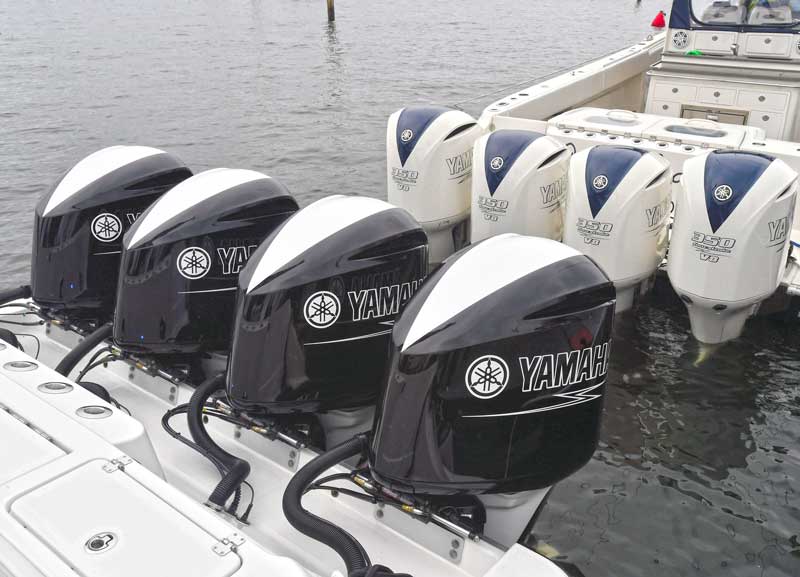Outboard Overload: Is there such a thing as too many outboard engines on a center console?

When I attended the 2017 Annapolis Power Boat Show, I was surprised to see so many big center consoles with multiple big outboards. Now boat and motor companies don’t pay for space at a big show to display packages that won’t sell. They put out what is trending in the market to be on the cutting edge of any new ideas.
I have been fishing in center consoles for a very long time, beginning in 1973 in my brother-in-law’s 22-foot Mako right up to this past August in a 31 Contender. I even owned a center console back in the 1970s when I had a 21-foot StarCraft.
I am well aware of the advantages of a center console fishing boat: lots of room to fish all around the boat and good balance with the console towards the center and the outboards installed off the transom. Center consoles are also lighter than a comparable cabin boat because it takes less material to build a console than it does a cabin. Storage is good because you can put fish boxes in the stern and dry storage in the bow.
For all their advantages, they do have one big disadvantage: they are very wet in anything but a calm sea. Getting back to the 1970s and that 22-foot Mako: we would usually have a very pleasant ride out to the canyons and reasonably good weather while fishing, but the ride home it seems was always wet. The wind would come up from the south and hit us on the port side soaking everyone on board to the skin.
Just to prove that some things never change, the trip I made to the Baltimore Canyon in late August of 2018 ended the same way. Three of us were perfectly comfortable on the ride out sitting on three bean bags in the stern. The seas were beautiful while we were fishing, but as soon as we turned for home, those same south winds hit the port side, and the three of us were soaked.
In your 20s, 30s, or even 40s, this may not seem like much of a problem. Once you cross that 50 mark, it takes a bit longer to recover from a two and a half hour pounding and being soaked in salt water.
The 31 Contender I was on had two 300-hp outboards, and it cut the seas as well as any deep vee. It took us two and a half hours to make the 60-mile run to Baltimore from Indian River Inlet and only two hours and 45 minutes to come home. I was told the boat could cruise much faster than that, but to conserve fuel on the way out and due to the five to six-foot seas on the way back, the captain cut down the speed.
Getting back to the 45- and 50-foot boats I saw at the Annapolis Powerboat Show, I was told some of them could cruise above 50 miles per hour. Whenever I hear these high speed claims, I have no doubt the boats can perform as advertised; my question is always, “When?”
I don’t care how many outboards you hang off the stern and how light the material used to make the boat is; you can only run as fast as the seas allow. And believe me, the seas don’t allow many days when you can open her up.
There is one group of anglers who have been running high speed boats for a long time. These are the folks that compete in the big-money king mackerel tournaments held in the south. They used Reggie Fountain’s boats and Donzies as well as other brands that have some impressive top speeds. These pros want to be able to run as far as necessary to catch a big king and make it back to the scales in time for the weigh in.
These boats have huge livewells, lots of cold storage, and big fuel tanks. They are pretty much one-trick ponies and are used in the tournaments and not much else.
So what advantage does a 50-foot center console with four or more outboards have over a similar cabin boat with twin diesels? Of course the cost of the center console will be lower and it may use less fuel, but I don’t know if that is a fact. Otherwise, if the fisherman wants to run long distances offshore, fish all day, and ride home in comfort, he or she may be better off with a smaller cabin boat.
I know everyone has different tastes and preferences, so if a 50-foot center console is for you, go get one. I don’t have enough money to buy either type of boat, so what do I know?
By Eric Burnley